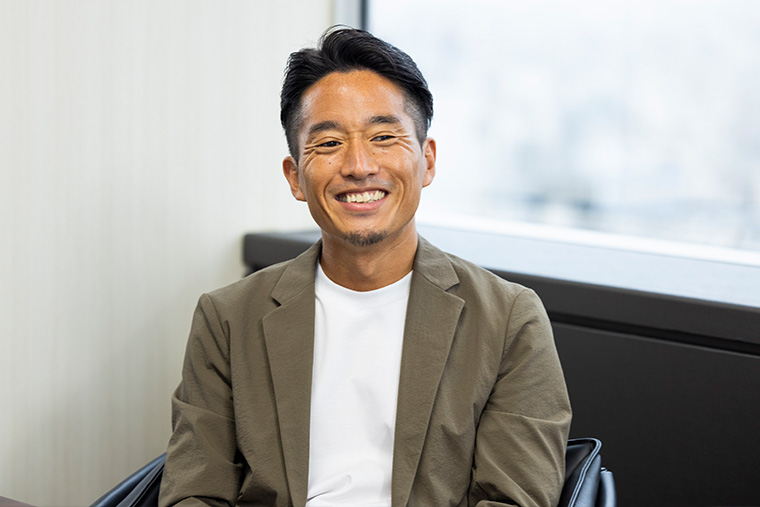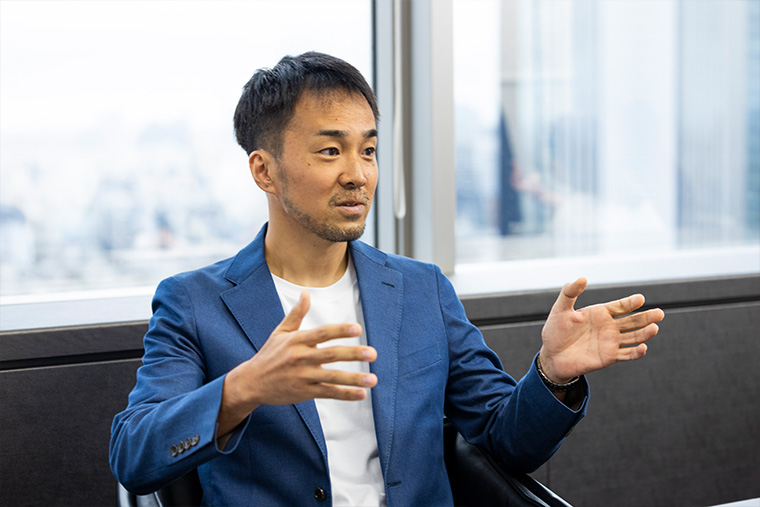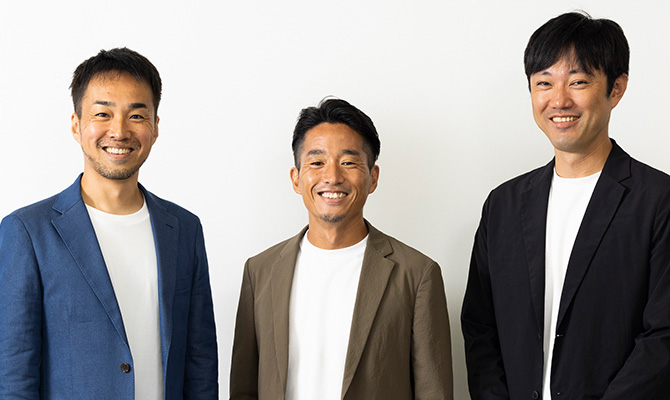Special Roundtable Discussion on Well-being
- TOP
- Material issues
- Special Roundtable Discussion on Well-being
-
Yoshiki Ishikawa
Representative Director
Well-being for Planet Earth Foundation -
Yuichi Sumi
President and Representative Director
WILL GROUP, INC. -
Daiki Toriyabe
Manager of Human Resources Development Department, Human Resources Division
WILL GROUP, INC.
The WILL GROUP considers improving well-being as a material issue that the Company should address. Many Japanese companies have designated well-being as a theme of business activities and we invited Yoshiki Ishikawa, the representative director of Well-being for Planet Earth Foundation, to discuss the initiatives of the WILL GROUP in the businesses we operate in Japan and overseas, mainly for human resource services. He met with our president and the manager of our Human Resources Development Department, who brings his perspective on the concept of well-being in the WILL GROUP and who pursues researches well-being and daily spreading of well-being throughout our company. We will talk about what is currently needed to improve well-being in the W-I-L-L* fields.
*Working, Interesting (enjoyment), Learning, and Living
What well-being means to the WILL GROUP
- The theme of this discussion is what well-being means to the WILL GROUP. This word means different things to different people, but I interpret well-being as the people in a community being able to feel good naturally.
- I also think of it simply as a good state. I think it is important to understand well-being as an idea over time (on a time axis). People can perform well (well doing) precisely because they are in a good state (feeling a sense of well-being). Performing well over a period of time creates a good future (well future). Well-being is promoted throughout the world, but our Group wants to create a well future by consistently achieving well-being and well doing.

Propagating well-being (positivity)
- The WILL GROUP sees improved well-being, a summation of all kinds of activity, as a material issue that we should address. Ishikawa-san, how does the content of this initiative strike you from the perspective of someone outside of the Company?
- The WILL GROUP is working toward a shift in work, technology, and global orientation by 2030 to deliver happiness to people around the world. The target of achieving well-being for one billion people in the final fiscal year is incremental and easy to understand.
- I want to help achieve well-being for all people. Having said that, there are many types of people and what I consider to be well-being is not for everyone. Some people derive a sense of well-being from taking on challenges while others do not, and some want only stability. Nevertheless, I want to create opportunities for employees and temporary staff to believe in their own potential and achieve well-being in the W-I-L-L fields.
- A research study found that when a person is in a state of well-being, it has a ripple effect on their family, friends, and even on their friends’ friends. One billion people no longer sounds like a dream when these ripple effects are also considered. People live in networks and these networks spread both the good and the bad. If we are going to spread something, it would be good that that was a positive sense of well-being.
- That is true. We are also conscious of these ripple effects. While interpersonal relationships with the people around you in the workplace are important, there are cases when temporary staff cannot fit into the workplace. The WILL GROUP places importance on having temporary staff work over the long term, and we strive to build a team at the client’s location through a hybrid staffing system where a field supporter (local manager) is stationed at the same workplace. The field supporter spends break times with temporary staff and supports them in their work, particularly in the initial stage of an assignment. The goal here is to support temporary staff as they build up their confidence as well as good interpersonal relationships in the workplace, leading to better performance.
- That is a good initiative. I have surveyed the work styles of temporary staff in the past. In response to a question on what impacted the well-being of temporary staff in that survey, the response selected most often was how temporary staff interacted with their supervisors.
- When I first joined the Company, I also worked as a field supporter at a major consumer electronics retail store, along with temporary staff. Looking back on that time, my work style also affected the temporary staff from other companies. There were times when the opinions of temporary staff did not reach the floor manager and an employee stepped in as a field supporter to communicate their opinions. I think that the value of hybrid staffing is being able to makes these types of change.
- Toriyabe-san is a pioneer of this ripple effect. He was the first within the WILL GROUP to use the word well-being.
- I first used well-being in a proposal to Chairman Ikeda, who was the company president at the time. However, my understanding then was that well-being would probably be the focus of organizational and human resource development in the future. In 2018, an event was held featuring Martin Seligman, the originator of the theory of positive psychology which had a profound impact on our corporate mission. and his talk entitled "the mission of positive psychology is to create a wold of well-being", resonated with me. The next year, we increased activities to raise awareness of well-being within the entire Company.
- While the word positive had been used in the Company before that time, it was not clearly defined. I also attended this event and thought, “Isn’t the positivity we place importance on also well-being?” However, we were unable to convert that idea into business value and I wondered at the time how to convey this interpretation as a concept. Toriyabe-san has worked to spread the concept of well-being within the Company by holding a number of workshops where participants first understand the concept of well-being and then ask themselves what well-being means to them and in their work.
- So, it was well-being that the WILL GROUP worked on up to now. Well-being is evaluated in new personnel programs and business development, but the things we have worked on for many years are also often re-evaluated from the perspective of well-being. It becomes easier to understand well-being when seen from the perspective of whose well-being: for employees in human resources, or stakeholders from the viewpoint of management, or customers in business.

- I feel the same as Ishikawa-san about the perspective of whose. The Human Resources Development Department encourages employees to place priority on their own well-being. That is because being an originator has a more positive ripple effect on those around us than trying to change others. I also first prioritize my own well-being in my personal relationships. And I think well-being in relationships is important. In my case, this includes relationships with colleagues in the Company, as well as relationships with my wife and within my family. You could say that it is a world within a radius of five meters, but it is nonetheless important. I think this is the essential foundation for sustainable well-being. If employees can continue to be aware of and prioritize well-being in their own relationships, the cumulative positive impact will be greater that then sum of all the factors.
Commonalities between human capital management and well-being
- I am digressing, but human capital management has become more important in recent years. The WILL GROUP is placing importance on people and I also think that mutual respect also contains elements that lead to well-being.
- Kunio Ito, the director of the Hitotsubashi CFO Education and Research Center at Hitotsubashi University began using the term human capital management in the Human Capital Management Consortium and it has been used globally in the context of diversity, equity, and inclusion (DE&I) for around 10 years. In the case of a company, human capital management means valuing the well-being of women, mid-career hires, workers from overseas, and others in a vulnerable position... In Japan, diversity is the factor that is most emphasized and discussions on this topic tend to center on increasing the number of women in management, but diversity essentially refers to improving the well-being and engagement of everyone, regardless of their gender.
- Companies should value human resources even if they do not use the expression human capital. This is the case in Japan as well. While lifetime employment is no longer the norm today, a company can sometimes play to its interdependent strengths with its employees. Overseas, human resources are more mobile than in Japan, people resign if a company does not pay attention to employee engagement, onboarding (initial training), and evaluations. Human capital management also implies thinking progressively and continually about whether the company and employees have potential and whether the company is consciously managing that potential when looking toward the future. However, during my conversations with stakeholders, they seem to be more interested in KPIs and performance rather than on ESG and SDGs, which I feel strange about.
- The stakeholder could be looking at this using a different time scale. Those who are looking at this from the short-term view are more concerned with differences in results from the KPIs and the plan. However, the more people focus on the long term, the more they are concerned about well-being and sustainability. This is especially true for investors and analysts, who are more interested with indicators like sales and profit that can be used to compare multiple companies, than in the individual initiatives of each company. Having said that, well-being will likely become a typical indicator in a few years. Standard and Poor’s (S&P) in the US has now added employee well-being (health and wellness) as an item on their global ESG survey. S&P has now surveyed more than 20 million employees about company well-being. It is becoming harder for companies with a low well-being (wellness) score to attract recruits. The Impact Management Platform, which is an international initiative, maintains that impact should be the focus when investing and has just incorporated well-being into the definition of impact.

Improving job satisfaction for temporary staff
- The temporary staff of the WILL GROUP are divided into two groups: those that feel good about their work style and those that feel a sense of unease while working. Those who feel good have another main focus they are working on. People who can work hours that suit them within while raising children and people who are working as temps while pursuing their own dreams are examples. On the other hand, there are people who are working while feeling a sense of unease over whether they can continue working as a temp in the future. The WILL GROUP is making sure that both types of temporary staff can get a sense of satisfaction from their work.
- Human resource services are also affected by changes in the external environment.
- That is true. Labor shortages and technological advancements are accelerating changes in the balance between supply and demand. There is a trend toward automating light work in sales, call centers, and manufacturing plants and other work that can be performed by inexperienced temporary staff, in particular. We want to provide feel good options to these people as well. While it ultimately comes down to individual choice, many people do not know what they want to do and what type of work suits them, and it is difficult to make an intentional choice.
- I frequently hear comments about not knowing the corporate atmosphere and what kind of person their supervisor is.
- People cannot choose from a large number of options when they have so many unanswered questions, so we are gradually increasing in the number of options that would make someone feel good from one or two to three or four. The WILL GROUP applies this approach at multinational corporations and is expanding this nationwide in Japan and overseas. Not many of our competitors at our size have so many occupational types and will grow the careers of temporary staff vertically as well as horizontally. One example of this is developing a career in corporate marketing by starting in sales and progressing to marketing and sales. Because people who work in call centers can respond politely and efficiently while using a system, they develop into talent capable of technical support, help desk support, and RPA (robotic process automation). People who work at manufacturing plants can advance his/her career from someone who performs light work to a skilled engineer. We have established a system that enables us to talk with temporary staff about what they want to do in the future. Preparing a career path and having well-being are the sources of the WILL GROUP’s competitive advantage.
- As you said, Sumi-san, thinking about the skills, careers, and lifestyles of temporary staff supports well-being and welldoing over the long term as well as job satisfaction. There is currently stiff competition for job applicants and matching also frequently falls short, but the WILL GROUP initiative should be a differentiating factor from other companies.


Coaching is an effective way to achieve well-being.
- Toriyabe-san is actually working on initiatives to achieve well-being and he will tell us about them.
- We first focus on relationships for well-being within the WILL GROUP. We feel that learning how to coach is an effective way to improve relationships. I have also learned how to coach and continue to see how coaching helps to improve well-being. That is because deviling into the question, “How do I want to live?” is at the core of coaching. It is also because coaching offers up much knowledge and many skills for creating better relationships. Acquiring coaching skills enables me to provide optimal service while maintaining the perspective of how the temporary staff might like to live. This approach also leads to better job satisfaction and well-being for the employees themselves, and it will improve corporate value if several thousand employees update their skills in this way.
- Have some people commented on how coaching changed their lives?
- Many have. This includes people who are energized daily by learning new things, people who are now able to sketch out their future, and people who became happy after being placed in their current environment... As you said in the beginning, President Sumi, well-being means different things to different people, but many people become able to develop their own well-being through coaching.
- I feel that providing opportunities to dialogue with many people is another effective way, in addition to coaching.
- Engaging in a dialogue enables us to believe in one another’s potential, to work together to draw out that potential, and continue to learn how to create together. I believe a good future can be realized in this way. I want to bring positive changes to individuals and the organization through coaching and link to the future the well-being achieved through dialogues with stakeholders.
- I will continue to work to improve well-being in the WILL GROUP and expand this throughout Japan and to the entire world.

